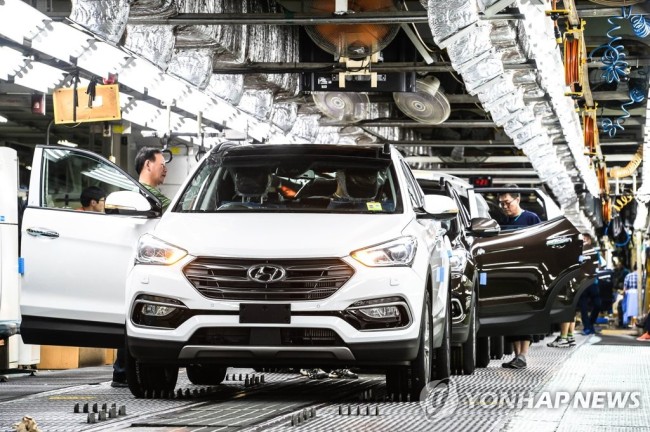
South Korea’s overall domestic industrial output decreased again in June, recording a three-month decline for the first time since July 2013, largely due to decreases in the refining and semiconductor sectors. But consumption increased by 1.1 percent compared with the previous month, according to data released by Statistics Korea on Friday.
The country’s overall output in June fell by 0.1 percent, with the semiconductor sector posting a 3.9 percent decline in production, following an 8.9 percent increase in the previous month. The slowdown in output was largely due to inventory adjustments during the period, Statistics Korea said.
Accordingly, the chips inventory level fell by 32.5 percent on-month, the data showed.
The semiconductor production amount is expected to recover as the chip “super cycle” is forecast to continue, an industry source said.
The refining sector also recorded a 7.4 percent decline in June, as local refiners halted production due to scheduled maintenance at facilities. According to a source from the refining industry, the production amount is likely to increase down the road, as refining margins in July are hitting an annual-high.
Meanwhile, output from the service and construction industries posted a 1.5 percent increase month-on-month, with sales increases in cosmetics and clothes showing signs of recovery.
While consumer sentiment hinted at future recovery, business sentiment in Asia’s fourth-largest economy remained negative toward the nation’s economic outlook, according to a survey conducted by the Korea Economic Research Institute.
The KERI asked Korea’s top 600 companies their opinions regarding future prospects of the economy. More than half of the 421 companies that responded to the survey expressed negative sentiment.
According to the KERI’s data, the business survey index for August was 92.4, remaining under 100 points for the 15th consecutive month, the longest period since the financial crisis in 1990s, when the figure remained below 100 for 31 consecutive months.
The BSI is a measure to gauge how the nation’s companies see the current and future economic circumstances. If the number of companies that expect economic outlook to remain negative exceeds their counterparts, the figure falls below 100 and vice versa.
By Shim Woo-hyun (ws@heraldcorp.com)
The country’s overall output in June fell by 0.1 percent, with the semiconductor sector posting a 3.9 percent decline in production, following an 8.9 percent increase in the previous month. The slowdown in output was largely due to inventory adjustments during the period, Statistics Korea said.
Accordingly, the chips inventory level fell by 32.5 percent on-month, the data showed.
The semiconductor production amount is expected to recover as the chip “super cycle” is forecast to continue, an industry source said.
The refining sector also recorded a 7.4 percent decline in June, as local refiners halted production due to scheduled maintenance at facilities. According to a source from the refining industry, the production amount is likely to increase down the road, as refining margins in July are hitting an annual-high.
Meanwhile, output from the service and construction industries posted a 1.5 percent increase month-on-month, with sales increases in cosmetics and clothes showing signs of recovery.
While consumer sentiment hinted at future recovery, business sentiment in Asia’s fourth-largest economy remained negative toward the nation’s economic outlook, according to a survey conducted by the Korea Economic Research Institute.
The KERI asked Korea’s top 600 companies their opinions regarding future prospects of the economy. More than half of the 421 companies that responded to the survey expressed negative sentiment.
According to the KERI’s data, the business survey index for August was 92.4, remaining under 100 points for the 15th consecutive month, the longest period since the financial crisis in 1990s, when the figure remained below 100 for 31 consecutive months.
The BSI is a measure to gauge how the nation’s companies see the current and future economic circumstances. If the number of companies that expect economic outlook to remain negative exceeds their counterparts, the figure falls below 100 and vice versa.
By Shim Woo-hyun (ws@heraldcorp.com)








![[KH Explains] How should Korea adjust its trade defenses against Chinese EVs?](http://res.heraldm.com/phpwas/restmb_idxmake.php?idx=644&simg=/content/image/2024/04/15/20240415050562_0.jpg&u=20240415144419)











![[Today’s K-pop] Stray Kids to return soon: report](http://res.heraldm.com/phpwas/restmb_idxmake.php?idx=642&simg=/content/image/2024/04/16/20240416050713_0.jpg&u=)